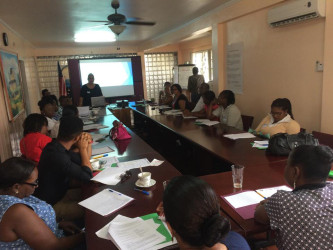Chief of Party for the USAID Advancing Partnerships and Communities (APC) Folami Harris said yesterday that she believes Guyana is ready to take up the reins of fully providing HIV treatment, care and support as the US-funded PEPFAR programme, which has been in effect here for ten years, phases out.
Harris was one of three speakers at the opening of a Children’s Rights Workshop yesterday, organised by the Society Against Sexual Orientation Discrimination (SASOD) with support from the APC. The workshop as aimed at building the capacity of civil society providers who serve orphans and vulnerable children (OVCs) affected by HIV as they shift from private to state services for treatment, care and support.
Speaking to Stabroek News following the opening, Harris said that while in 2014 the treatment programme serviced 819 children and 889 adults, this year there was a drop where only 819 children were treated.
“We are concerned about the drop, but we know why it decreased,” she said, while stating that it was because of a reduction in funding. She explained that funding lessened because PEPFAR determined that there was much freer access to treatment, which has been effective over the years.

“The overseas support is not as greatly needed as it was before and they have been supporting us for ten years,” she added, while expressing her confidence in the government taking the reins of the programme. “The government should be ready…. I believe they are in a good position. I don’t think the government is incapable of doing it. It’s not the skills that are the issue it’s the will and yes it requires resources but we have seen the NGOs doing it with limited resource and they can be contracted by the government. It’s a national issue and should be addressed nationally,” she added.
Harris said that while the programme has been scaled back this year, it will be slowly taking its leave and should wrap up in October next year.
Meanwhile, the workshop also sought to increase the awareness of children’s rights in Guyana, specifically with regard to issues of abuse and neglect.
On this subject, Harris reminded participants that there are many ways in which children can be assisted. “… When it comes to children’s rights, we often let our own injuries, whether physical or emotional, get in the way of us helping them,” Harris said. “We see a child in need and we say, ‘Hey, we survived it so they can survive it too,’ you know, that kind of thing,” she added.
While that is one approach that needs to be corrected, she said there are others who recognise the need but are unsure what to do. She emphasised that the aim of the workshop was to educate the different organisations that all stem from different regions about rights, what to do, and where to turn. “Some people know where to turn but they don’t have the skills to do so,” she added, while explaining that persons may “know a family needs intervention and you know this and this agency might be able to help them, but you don’t know how to negotiate it.”
The workshop, she said, aimed at addressing all of the factors that prevent other NGOs from fully addressing and implementing the rights for the benefit of the children.
“We need to deal with own scars, manage them so you can help the children move ahead,” she passionately stated.
The main goals of yesterday’s workshop were to: familiarise the organisations with legislation related to children’s rights in Guyana; understand why organisations should develop programmes which serve children with the best interests of the child as the most paramount consideration; identify the key elements of a child-centred approach and relate these to the immigration of services for OVCs from NGOs to state agencies.
It was expected that by the end of the workshop, participants know would where to access available state services for OVCs; have knowledge of the laws pertaining to children’s issues as well as international standards on children’s rights.
Other guest speakers were Minister within the Ministry of Education Nicolette Henry and UNICEF Resident Repre-sentative Marianne Flach.
Presenters included Danuta Radzik of Help and Shelter and Anne Green of the Child Care and Protection Agency.





